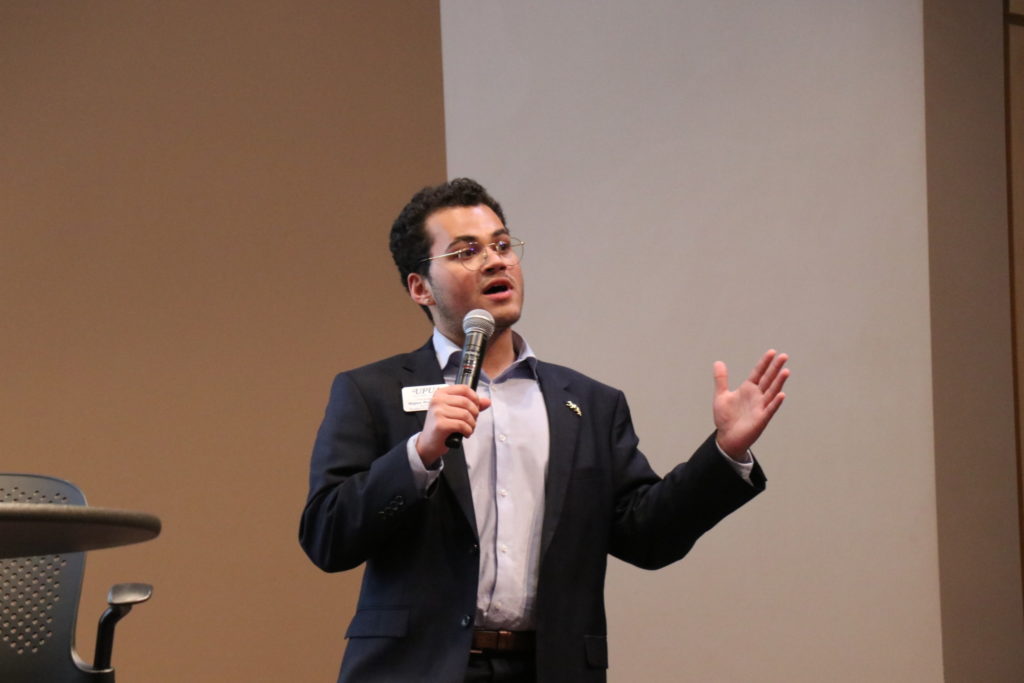What pops into your head when you hear the words “student government?” You probably think of a small group of students who sit around and talk about your school’s policies in a meeting for a short time. Perhaps your mind goes towards the image of bake-sale fundraisers, hosted to pay for some obscure program or trip that you don’t care about. You may also not associate the words “student government” with the words “effective,” “visible,” or “significant.” After all, can you recall the last time you genuinely paid attention to the affairs of student government? While the inner workings and policies of your high school may not appear as high stakes as actual politics, perhaps Penn State’s Undergraduate Association can scratch that itch.
Check out ten reasons to get involved with student government at Penn State University.
1. You’ll Meet New People

Ask anybody at Penn State how best to meet new people and almost every time they will tell you to join a student organization. Whether you choose to join a sports team, a niche hobby club, or an advocacy group—you will certainly find new friends. With UPUA, however, the people you meet, work and debate with can come from all walks of life and interests. With no restriction on only allowing students interested in politics and administration in, the organization aims to represent all undergraduate students. This includes you.
“I think that a lot of people have this misconception that UPUA is for people who want to go into political science or want to go to law school. As an engineering major who is going to go into health care, I can confirm that that is totally not the case. Once I got to Penn State, I applied as a freshman for the First Year Council and joined a group of 30 Freshmen where we got really, really close,” UPUA Vice President and Penn State University junior Sydney Gibbard said. “We got to shadow and learn more about the organization before really jumping right in and working on projects, which I think was a really good introduction, to just get our feet wet.”
Over 50 students involve themselves with UPUA as representatives, judges and executive members. These students span from all across Penn State’s wide variety of programs and majors. In addition, a myriad of Penn State’s other student organizations get involved with UPUA to advocate for their own issues. UPUA draws on constant interaction with the student community, meaning you’ll never know which people from which club may cross paths with you during your term.
2. Don’t worry about getting in

Now, some students may instantly connect the idea of student government with elections, which could put them off of joining. Needing to compete with others to win a seat in any of the branches can seem intimidating in concept. The good news? You possess a high chance of winning a spot in the legislature due to low competition. While highly contested positions do exist, many of the general body roles remain open for much of the year.
“If you were to look at our previous elections, for the past two years, we have had very nearly uncontested elections. They often [had] less students running than the actual number of seats available and we had write-in candidates winning seats. What that should tell any aspiring students is that there is a very, very good chance that if you run for an office, you’re going to get that office,” Director of Governmental Affairs and PSU sophomore Ben Brauser said. “I would not feel discouraged because of a sense of competitiveness. I know that the few students who ran and had not been elected were often appointed to other roles in student government. It is very unlikely that a student who is interested in serving wouldn’t have an opportunity to do so. If you are at all interested, there’s certainly an opportunity out there.”
For those of you wondering why students’ government needs you, hopefully this serves as proof. Penn State houses a massive undergraduate population. More than enough room exists for you to help represent it to the administration. You might not get elected president in your first election, but you can easily start small and get your foot in the door. So get running.
3. Practice Politics

UPUA primarily advocates for and represents students to the Penn State administration. While this may sound simpler than executing all their passed policies, it does not water down UPUA’s political structure and processes. The student government maintains a structure similar to the United States federal government. Its members all operate within one of three different branches and five different committees. This means students looking to gain some experience in the process of politics can use UPUA as an opportunity to practice working in a governmental organization.
“Like the federal government, we have an executive, legislative and judicial branch and within that the roles kind of do mimic how the federal government works. We have a president, a vice president and [several] committees within the general assembly, so that mimics the House and Senate. I definitely think it is a fantastic way to figure out how politics works at a local, smaller level and then realize your passion [for it], if that’s what you plan on doing after graduation,” UPUA Executive Director of Public Relations and PSU sophomore Rayna Alexander said.
A normal student in UPUA will learn about proposing, debating and passing policy between the branches while in the org. This can be a boon to students in political majors. Getting experience with a governmental body would look great on your resume. For any other students, getting involved in UPUA could affect how you look at our federal government and its many facets. It helps to know how political change occurs if you want to influence it.
4. Learn about new groups and events

Naturally, an organization that requires you to represent the student population will also see you interacting with a variety of said students. Many student organizations and populations face different issues they need brought before the Penn State administration. When they seek representation, they talk to a UPUA legislator or committee. This can help you find out about clubs you may never hear about otherwise. In fact, you may find your next club to join after UPUA.
“Our first-year council consists of about 30 members and inevitably some of them do not stay in UPUA. But that’s okay. Because what UPUA does for them is it teaches them about offices on campus, how the university is structured, other organizations who are doing similar type of work and also organizations that we have collaborated with. It teaches them about those so that they can go out and carry out the skills that they gained and apply it elsewhere,” Gibbard said. “I don’t want to say we’re the be all end all and [we] know everything about Penn State, because we definitely don’t, but it’s definitely a good place to start.”
Through joining a club fresh off of UPUA, you could hone the skills needed to take on a leadership position in a club’s executive board. You’ll already possess skills in public speaking and discussing policy changes with a small group of people. Running in an election for a position will simply feel like treading old ground. To top it off, you’ll even possess a better understanding of what it means to act as a representative for a group of students. Think of it as a useful payoff for all your practice in student government.
5. Get hands-on experience

Just because UPUA involves meetings and policy discussions, does not mean less opportunity for more hands-on involvement. On the contrary, the organization requires a bit of hands-on work from all of its members from every level. Part of UPUA involves going out into the HUB and setting up the UPUA booth. These booths pass out information to students on whatever issues concern student government at the time. In addition to these booths allowing members of the organization to meet with the students they represent, it can also serve as a chance to work with other legislators and get to know them better.
“We do all of the stands for boothing for UPUA. So we’ll be in the hub, handing out information, getting out the vote, sexual assault awareness, handing out free textbooks, that’s a big part of being a representative that doesn’t always get brought up,” Brauser said.
In addition to booths, UPUA also hosts a variety of other activities. Through collaborating with other clubs, student government has hosted roundtables, panels, discussions and speakers. Just this week, with finals wreaking havoc on the student population in terms of stress, UPUA funded a free late-night coffee station to give night owl students a boost. Thus, student government involvement goes beyond simply meeting in a room and talking to other representatives. It means going out and getting your hands dirty and interacting with those you represent.
6. Get Your Issues Heard

Let’s face it: as a college student, your life hosts numerous problems that infect your existence like a virus. I get that. They afflict me too. Maybe Penn State charges you too much for too little. Maybe you think Penn State could do more for its students in the LGBTQ+ community. Perhaps the stairs outside your hall could get reclassified as a deathtrap with how slippery they get in winter. Fortunately, UPUA provides a place for you to voice your concerns and make an impact on Penn State.
“Why I got involved with UPUA is because you can do so much. It’s the body of advocacy for the student body. If you have a problem on campus where you want to make change, you can do it through UPUA, we have access to [funding],” Alexander said. “We have money to help with campaigns, or if students want to come to us and they need funding for an initiative, we can help with that too.”
The flexibility offered when voicing your concerns to student government helps as well. You could simply speak to one of the representatives on your own, perhaps through sending an email or setting up a meeting. You could also approach the UPUA with a student organization behind you. UPUA contains members from several of Penn State’s caucuses, including the Black, Latino and LGBTQ+ causes to name a few. In addition, the student government maintains accounts on Instagram, Facebook and Twitter. Don’t hesitate to reach out.
7. Promote Other Students’ Concerns

On the other side and arguably the most prominent side of UPUA, student government represents the needs of other students. Some members serve as Academic Representatives in the Legislative Branch, representing their academic colleges. On the other hand, At-Large Representatives advocate for the general student body. Regardless of which position you get sworn into, you will also need to join at least one committee. This will allow you to focus your efforts into one general area of issues, rather than tackling a random assortment all at once.
“Shared governance is essential because it allows for accountability between students, faculty and administration. Student government does matter, [it] is how you advance tangible initiatives on university policy to change things,” UPUA President and PSU junior Najee Rodriguez said. “You have the ability to represent over 40,000 plus undergraduates, but also to really leverage and advance work that you’re passionate about. You have the privilege of being put in meetings with administration and other relevant stakeholders to advance these things and that shouldn’t be taken lightly. It should be motivating and it should be something that people want to do and are passionate about.”
While student government does not require complete public servitude like a job in the national government, you will need to represent the students of Penn State to the best of your abilities. To juxtapose my statement from the last section: everybody deals with problems every day. Many of their issues may not even affect you directly in any way. If you can treat these issues as though they actually do affect you and wish to do so, you may find a home in student government. Even better, you’ll create welcome changes for the Penn State community.
8. A Variety of Committees

The legislative branch of UPUA features five unique committees to process and discuss new policies and student issues. There exist committees on academic affairs, student life, justice and equity, facilities and the committee on governmental affairs. The Academic Affairs committee handles issues relating to the undergraduate academic experience. The Justice and Equity Committee seeks to help marginalized communities on campus. The Committee on Governmental Affairs represents the undergraduate bodies at local, state and federal levels of government. The Facilities committee deals with matters of infrastructure and the Student Life committee takes on any issues not covered by the other four.
“All representatives in the legislative branch are required to sit on at least one committee, but they can sit on upwards of three committees. I would say on average, we see two being that sweet spot of committees that people sit on. My past two years in UPUA, I served on two committees,” Justice and Equity Committee Chair and PSU junior Carter Gangl said. “There is definitely some overlap between the committees but I would say they’re all there to serve their own individual purposes and have their own unique projects they all work on.”
With the amount of variety each of these committees provides, any student can find one appealing. The issue of slippery stairs could go to the Facilities committee. The issue of price could go to Academic Affairs. Whether advocating or representing, there exist several specific choices of where to send your issues. Take advantage of them.
9. It looks good on a resume

Now, some of you may want to join UPUA because of how it looks on a resume. No shame in admitting it, of course. College makes for an ideal time to grind your skill and make yourself look good for an employer. You want to show that your time was spent effectively. You’ll find UPUA can help with that too.
“It’s a great resume builder, you learn a lot of really good interpersonal skills, as well as technical skills and organizational skills. It forces you to be organized, you need to know how to manage a calendar, how to manage your time well. I would say that’s been a super valuable skill that I’ve been able to take through my time at UPUA, which I’ve been able to talk about in my interviews and in different job opportunities I’ve had,” Gangl said. “This is a great opportunity to get those really important skills that are fundamental, not only to be successful in your job, but also to manage people in a successful way [and] work in a team.”
Whether or not you want a career in politics after school, it certainly helps to say you were part of student government. The organization requires time and commitment, as well as an ability to care about the student population. Any employer looking for a leader may think twice about passing on someone with those skills. In addition, learning how to speak in front of people can help those of you who get nervous in interviews. There exist a whole host of personal benefits just for you to master and utilize.
10. They won’t leave you out to dry

A sad fact of life remains that every college and school in existence contains some toxic student organizations. Some student organizations appear open and friendly to all, only to suffer from an infestation of cliques and squads. Other times you may find one or two members who seriously bring down the vibe of the entire club. Even worse, some clubs can just make you feel lonely even when fully surrounded by friendly people. For UPUA, however, most members praise its community and how members help each other out.
“I think my biggest piece of advice is don’t be afraid to ask people for help. UPUA can be a very daunting organization and if you need help people are here. I know that Najee [Rodriguez] and Sydney [Gibbard] are always here for me if I ever need help. There’s our Chief of Staff Jeanelle Loiseau and Deputy Chief of Staff Cade Miller, all super helpful. Even today, they’ve been helpful with me trying to figure out how to get onto the LinkedIn page and stuff like that,” Alexander said. “Everybody really wants to make everyone else succeed.”
At the end of the day, a club survives on the community it creates. People need to work together to make a team work, especially in an operation as wide in scope as UPUA. With a student body made up of students like you, chances remain high that you’ll meet other people in the same place or formerly in the same place as you. So, if the prospect of representing the thousands upon thousands of undergraduate students at Penn State seems daunting to you, don’t worry. Your future constituents know the feeling and can help you out.



















